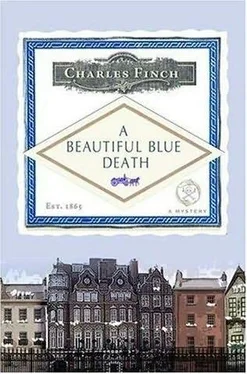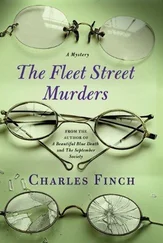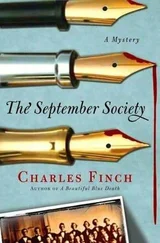Charles Finch - Beautiful blue death
Здесь есть возможность читать онлайн «Charles Finch - Beautiful blue death» весь текст электронной книги совершенно бесплатно (целиком полную версию без сокращений). В некоторых случаях можно слушать аудио, скачать через торрент в формате fb2 и присутствует краткое содержание. Жанр: Исторический детектив, на английском языке. Описание произведения, (предисловие) а так же отзывы посетителей доступны на портале библиотеки ЛибКат.
- Название:Beautiful blue death
- Автор:
- Жанр:
- Год:неизвестен
- ISBN:нет данных
- Рейтинг книги:5 / 5. Голосов: 1
-
Избранное:Добавить в избранное
- Отзывы:
-
Ваша оценка:
- 100
- 1
- 2
- 3
- 4
- 5
Beautiful blue death: краткое содержание, описание и аннотация
Предлагаем к чтению аннотацию, описание, краткое содержание или предисловие (зависит от того, что написал сам автор книги «Beautiful blue death»). Если вы не нашли необходимую информацию о книге — напишите в комментариях, мы постараемся отыскать её.
Beautiful blue death — читать онлайн бесплатно полную книгу (весь текст) целиком
Ниже представлен текст книги, разбитый по страницам. Система сохранения места последней прочитанной страницы, позволяет с удобством читать онлайн бесплатно книгу «Beautiful blue death», без необходимости каждый раз заново искать на чём Вы остановились. Поставьте закладку, и сможете в любой момент перейти на страницу, на которой закончили чтение.
Интервал:
Закладка:
“This is a beautiful flower, don’t you think?”
“Indeed I do.”
“I mean to give it to Lord Russell’s wife this evening.”
“Are you dining with the Prime Minister?”
“I am,” Barnard said. He looked up and smiled. “But breaking my fast with no less a friend.”
It was an odd thing to say. Barnard went back to his flower. There was a pot of tea, and Lenox, in the absence of an offer, poured himself a cup.
The window by which they sat overlooked a small garden, full of banks and rows of flowers less fantastically unusual than Barnard’s orchids but beautiful nevertheless, and Lenox stared into it until his host saw fit to speak. The moment came at last, after eggs and bacon had been served and Lenox had eaten a good deal of them.
“I’m getting a new man in here,” Barnard said, to open their conversation.
“Are you?”
“To replace Jenkins.”
Lenox’s heart fell. “Why?” he said.
“Incompetent. Getting a man named Exeter. Jenkins insisted that it was murder. Nonsense, I told him. The girl was probably jilted. Happens all the time.”
“It was murder, George.”
Barnard paused and looked him in the face. “I disagree.”
“Do you feel no responsibility to the girl?”
“I do. But I think your facts are wrong. You’re only an amateur, Charles.”
“That’s true,” Lenox said.
“And Exeter seems to be leaning toward my theory on the matter.”
“Exeter.” Lenox sighed.
“I want the plain facts, Charles, and I don’t think you’ve got them. Due respect. Bringing Toto’s failure of a husband in as a witness. No jury would believe a drunk. And Exeter’s a good man. Jane has no need to worry. Tell her it will be solved. Or, better yet, I’ll stop by.”
“No, I can tell her.”
“As you please.”
Lenox stood up. “All the same, George, you won’t mind if I look into a few of my ideas?”
“Not at all. But in the end, we’ll see what the Yard thinks of it.”
“Of course.”
“Have you had enough to eat?”
Lenox took a last sip of tea. “Delicious, as always,” he said. They drifted out into the main hallway, where he saw a familiar face.
“Mr. Lenox, sir, how do you do?”
“Very well, Inspector Exeter”-for it was the sergeant himself-“though this matter weighs on my mind. We must do our best for her.”
“Aye, well said, Mr. Lenox.”
Barnard said, “You know this man, then?” Lenox nodded. “Look here,” Barnard went on, addressing Exeter, “you’ll figure this out straightaway, won’t you? I’ve no doubt you’re as incompetent as the rest of them.”
“No, sir,” Exeter said. He glanced at Lenox with a sort of uneasiness.
“Sure you are. But on this one you suspend your usual stupidity, all right?”
“Yes, sir. It’s in good hands, sir. You can trust me.” He smiled weakly.
Barnard turned his attention to Lenox. “I hope you’re coming to the ball next week?”
“Of course.” The ball was an annual event at Barnard’s. Of the winter balls it was the best known, and while during the season there would usually be several such affairs on a single night, nobody dared to throw one opposite his.
“Farewell, then,” said Barnard. He looked intently at the flower even as he said it, and Lenox was left with the inspector from Scotland Yard.
Exeter was a large man, with black bushy eyebrows, a matching mustache, and thick pink features. He wore a full uniform wherever he went, and his helmet drooped over his eyes. He swung a blackjack around by its leather hoop seemingly without cessation, excluding the times when he put it to other use, most often when he dealt with what he called the lower orders.
London’s police force was barely thirty-five years old. Sir Robert Peel had organized the first Metropolitan Police Force in 1829, when Lenox was a lad, and as a result the men who joined were called either peelers or, more likely, bobbies. Its powers were new and uncertain, and Exeter represented both the good and the bad in the institution: the better chance of public order, and the risk of the abuse of the power needed to maintain it.
When he entered the force, Exeter had recently retired from the military and had chosen to become a beat man, walking the streets at night and taking the word beat for each of its several meanings. A quick series of retirements and deaths within the Yard had seen him promoted beyond his ability, and hard work had allowed him to rise even higher. He was now one of the half dozen most prominent detectives on the force, and also among the least naturally talented or intuitive of his rank.
There was no point, for Lenox, in trying to tell himself that he did not dislike Exeter. The man was a snob toward those beneath him, and a cloying sycophant to those above, unless they happened to come under his power, when he dropped all pretense of respect and became merciless. And yet, thought Lenox, I don’t envy him, having to deal with a man like Barnard. That beastly talking-down to. He thought guiltily that he was glad he could afford-literally-not to put up with a man like Barnard. If only Exeter had been slightly more intelligent… But then, he thought, if wishes were horses, beggars would ride.
The housekeeper brought Lenox his hat and his coat, and as he put them on he said a final word to Exeter.
“If I may give you one piece of information, Inspector-the girl was murdered.”
“That sounds like an opinion to me, Mr. Lenox.”
“It is not, Inspector. Good day.”
And he walked out through the heavy doors, trying to imagine a way in which he could solve Prue Smith’s murder without access to any of the suspects, for he knew he had probably entered the house in a professional capacity for the last time during this case.
Chapter 9
L ondon on a winter midday held few pleasures for Lenox. There was smoke in the air, which made his eyes tear, and there were too many people along the sidewalks, fighting for the thin path of cobblestone without snow piled atop it. And yet he felt more determined today than he had yesterday evening. In part because Exeter was involved.
He had set himself just one task for the day, or at least until Graham told him what he had discovered, and that was to see if he could trace the bella indigo that had killed the young maid. In the meanwhile, he was walking toward the Houses of Parliament, after having run a morning’s worth of overdue errands, to have lunch with his older brother, Edmund.
His brother held the seat of Markethouse, the town attached to their family’s estate, Lenox House, and while he was not active in the Parliament, exactly, he attended when he could and could be counted to vote along party lines. He was, like Lenox, a liberal, and he approved of the reforms of the last thirty years, but he was also a baronet and held a good deal of land, which made him generally well-liked on both sides of the aisle-or at least accepted as a known quantity.
His full name was Sir Edmund Chichester Lenox, and he lived with his wife, Emily, a pretty, plump, motherly woman whom everyone called Molly, and his two sons, in the house where he and his brother had both grown up. He had two distinct personalities, Lenox always felt: his more businesslike demeanor, in the city, and his truer self, the man who resided at home and felt most comfortable in old clothes, out for a day of shooting or riding or gardening. He was two years older than Charles and, while they looked alike, Lady Jane always said they were instantly recognizable as themselves. Edmund was the same weight and height, but he looked softer, and his manner, while equally polite, was somewhat more eccentric, a trait no doubt cultivated by the solitude of Lenox House in comparison with London.
Читать дальшеИнтервал:
Закладка:
Похожие книги на «Beautiful blue death»
Представляем Вашему вниманию похожие книги на «Beautiful blue death» списком для выбора. Мы отобрали схожую по названию и смыслу литературу в надежде предоставить читателям больше вариантов отыскать новые, интересные, ещё непрочитанные произведения.
Обсуждение, отзывы о книге «Beautiful blue death» и просто собственные мнения читателей. Оставьте ваши комментарии, напишите, что Вы думаете о произведении, его смысле или главных героях. Укажите что конкретно понравилось, а что нет, и почему Вы так считаете.












